Key takeaways:
- Firefighter training encompasses physical fitness, technical skills, emotional resilience, and the understanding of fire behavior.
- Effective emergency preparedness relies on clear communication, teamwork, and the psychological readiness to handle high-pressure situations.
- Adaptability, trust among team members, and physical fitness are crucial skills necessary for firefighters to perform effectively in emergencies.
- Real-life experiences emphasize the importance of focusing on tasks, maintaining situational awareness, and the emotional aspect of decision-making during crises.
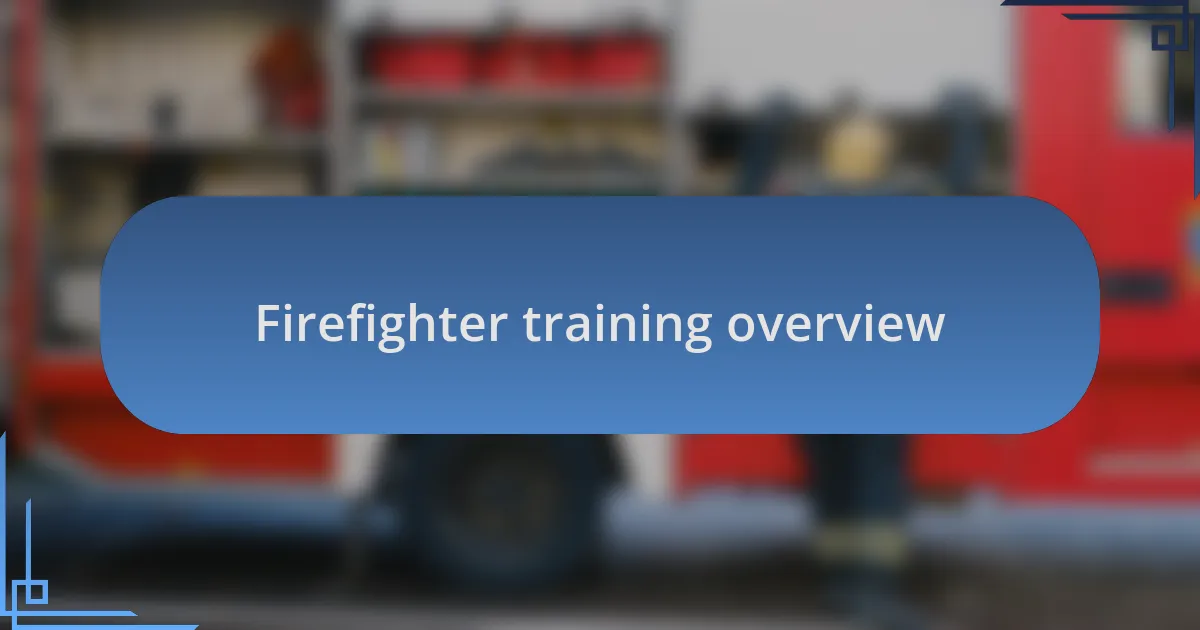
Firefighter training overview
Firefighter training is a rigorous process designed to prepare individuals for the intense realities they will face on the job. From physical fitness to technical skills, every aspect of the training is vital for building competence and confidence. I recall the endless hours of drills that, at times, felt exhausting, but I now see them as the foundation of my preparedness.
A significant part of the training involves not just learning how to operate equipment but understanding the science behind fire behavior. I remember one session where we discussed how heat and smoke spread—it was like uncovering the secrets of the fire itself. Have you ever thought about how quickly a room can go from safe to deadly? It’s a sobering realization that underscores the importance of our training.
Emotional resilience is another crucial element that often gets overlooked. I’ve seen trainees struggle with the pressure during simulated emergencies, and it’s in those moments that true character is revealed. How do you handle fear and uncertainty? For us, these drills aren’t just about the techniques; they’re about cultivating the mindset required to face life-or-death situations effectively.
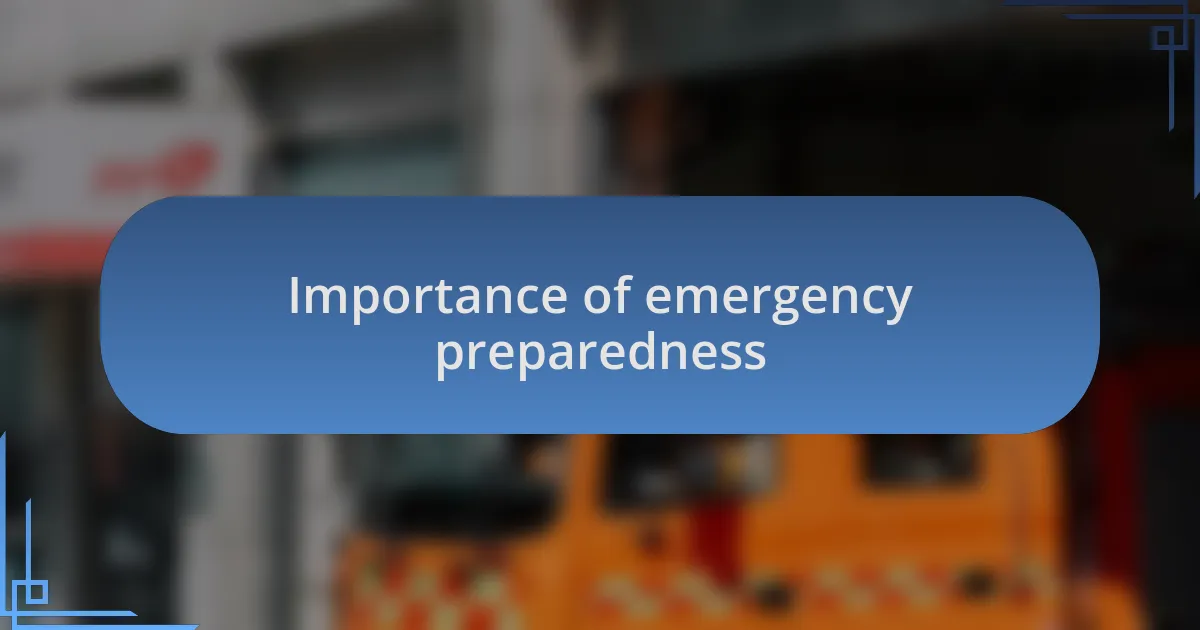
Importance of emergency preparedness
Emergency preparedness is not just a checkbox on a list; it’s a lifeline during crisis situations. I vividly remember an incident when we had to respond to a multi-story building fire. The planning and drills leading up to that day made all the difference, as we relied on our training to adapt rapidly and make split-second decisions. Have you ever found yourself in a situation where every second counts? Knowing what to do can turn chaos into a coordinated effort.
One of the aspects I sometimes reflect on is the significance of having a clear communication strategy in emergencies. I recall a time when our team had to navigate a heavy smoke condition, and effective communication helped us stay focused and keep each other safe. How often do you think about the people around you relying on your judgment? It’s crucial to remember that preparedness extends beyond just individual skills; it’s about creating a cohesive unit ready to tackle challenges together.
Moreover, the psychological element of preparedness cannot be emphasized enough. I still think back to my early days when the fear of the unknown loomed over me during live drills. That fear evolved into a sense of responsibility as I learned that being prepared meant being equipped to support not only myself but also my team and the people we were serving. How do you build that mental fortitude? By embracing preparedness as not just a skill set, but a vital mindset that can save lives.
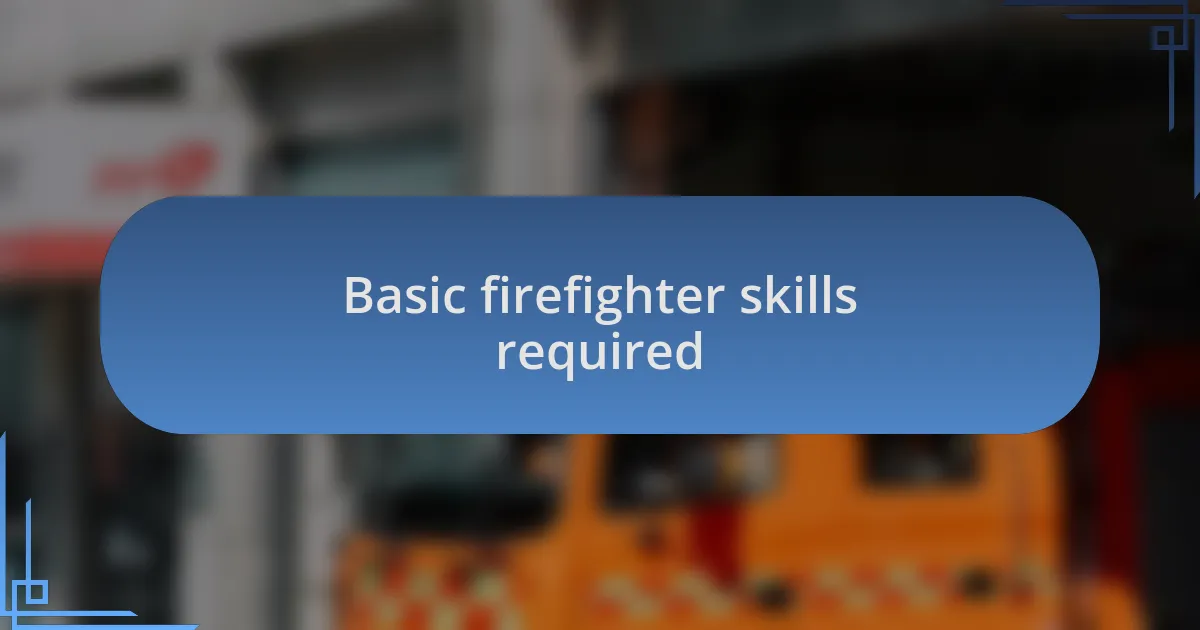
Basic firefighter skills required
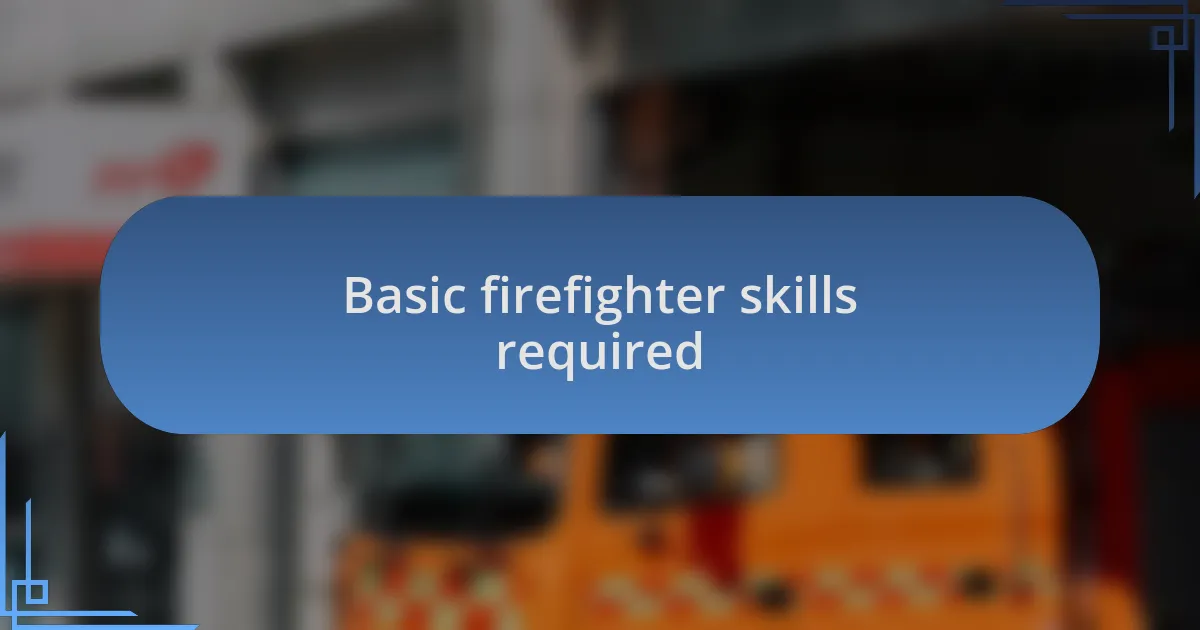
Basic firefighter skills required
When I think about essential firefighter skills, the first that comes to mind is adaptability. In a critical moment during a training exercise, I was placed in a scenario where the conditions changed rapidly. My ability to pivot, reassess the situation, and make quick decisions was put to the test. Have you ever had to adjust your approach unexpectedly? It’s in those moments that true skills shine through.
Another fundamental skill is teamwork. I remember the first time we conducted a mock rescue; the way each member of our team instinctively knew their role made the operation flow seamlessly. Working in unison isn’t just a buzzword; it’s a necessity in emergencies. It reinforces the idea that every team member’s contribution is vital. How do you foster that trust and collaboration with your colleagues? By consistently training together and building strong relationships, we create a safety net that feels almost unbreakable.
Finally, let’s not overlook the significance of physical fitness. The demands of firefighting often call for us to perform at our peak. I recall a challenging training session where we had to carry heavy equipment up a hill, and it reminded me of the physical toll real-life scenarios can take. Are you prepared to meet that challenge? Staying in shape isn’t just about being fit; it’s about ensuring we can serve our community effectively when it matters most.
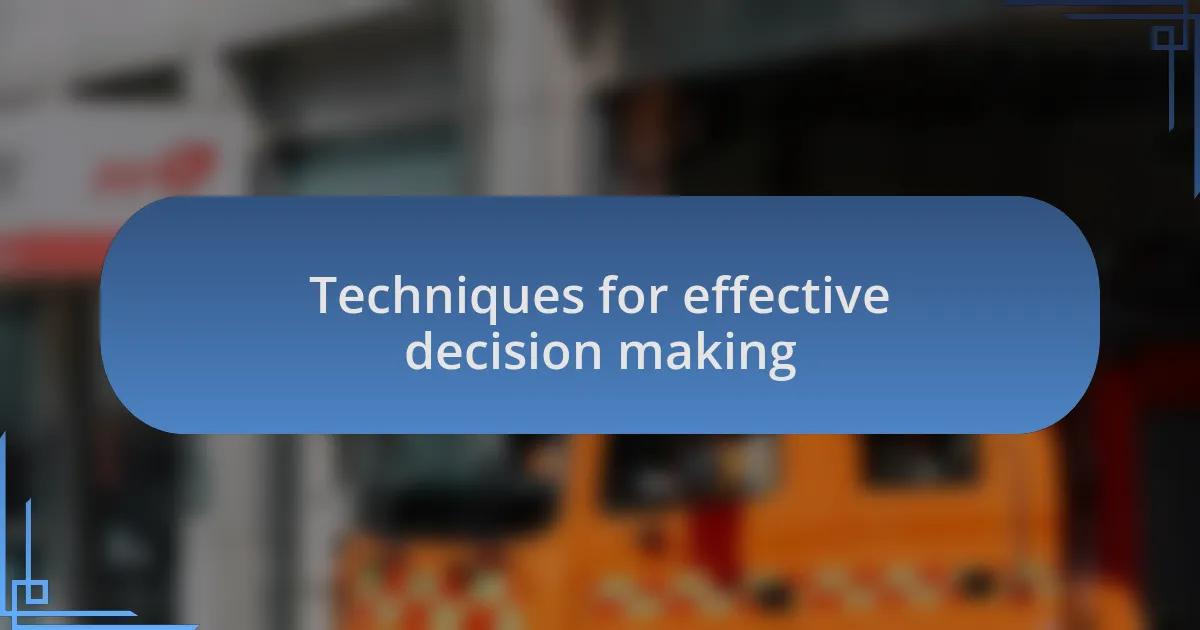
Techniques for effective decision making
When confronted with urgent situations, I rely heavily on the technique of prioritization. I recall an incident during a training drill where the clock was ticking, and the pressure was on. My instinct was to evaluate which tasks were most crucial—saving lives or mitigating damage. This straightforward yet powerful technique enabled me to channel my energy effectively, steering the team towards immediate actions that made a real difference. How do you determine what to tackle first in your own high-pressure moments?
Another vital technique is maintaining situational awareness, which has been critical in my experiences. In one particular scenario, I noticed subtle changes in behavior from fellow team members as we entered a structure fire. This heightened awareness allowed me to gauge their emotional state and adapt my communication accordingly. Are you aware of the signs around you that can guide your decisions? Understanding the dynamics of the situation can often lead to better outcomes than relying solely on textbook tactics.
Finally, practicing scenario-based training has proven invaluable for honing my decision-making skills. I vividly remember a simulation involving multiple victims in various states of distress. The realism of that training pushed me to think on my feet and implement decisions swiftly. Have you ever participated in a simulation that felt all too real? It’s through these exercises that I’ve learned to trust my instincts, balance competing priorities, and make choices that are not just instinctive but also informed by experience.
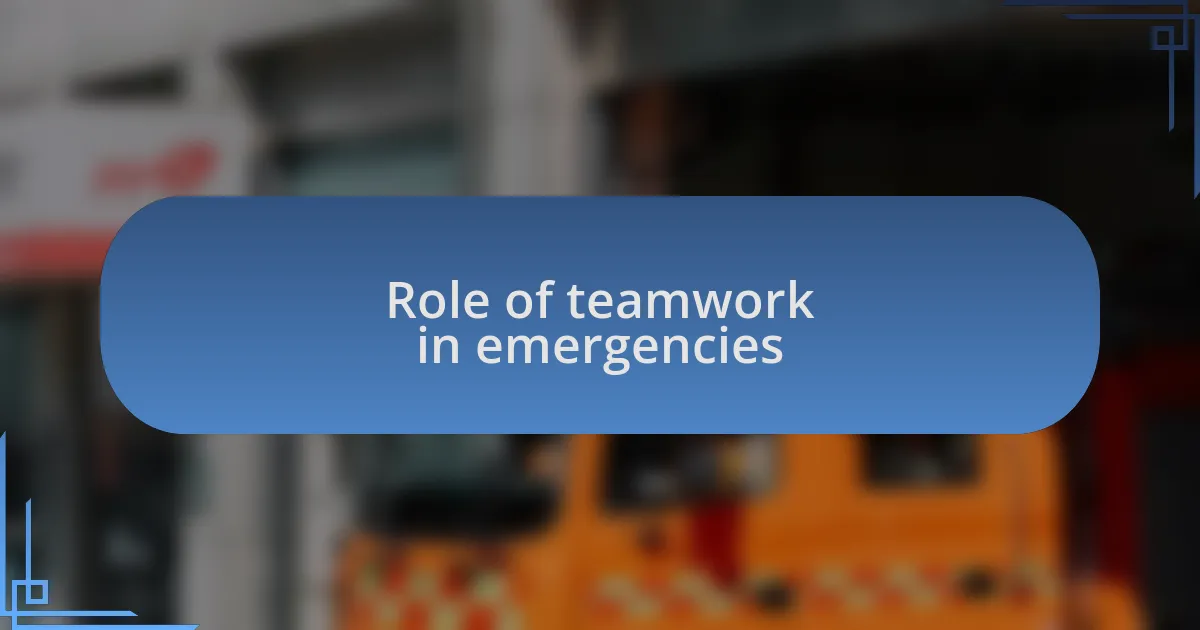
Role of teamwork in emergencies
In emergencies, the essence of teamwork cannot be overstated. I remember one particularly chaotic night when my team and I responded to a multi-vehicle accident. Each member knew their role, and we moved like a well-rehearsed machine. The synergy we had built during countless training sessions allowed us to communicate silently, through glances and gestures. How often do you rely on your team’s instincts in the heat of the moment?
Trust forms the backbone of effective teamwork in such critical situations. During a challenging rescue operation last summer, I had to put my faith entirely in my partner’s judgment as we navigated dangerous conditions to access a trapped victim. That moment highlighted for me how deep-rooted trust enables seamless collaboration, allowing us to take calculated risks without second-guessing each other. Have you ever felt that kind of trust in a professional setting?
Ultimately, the strength of a team lies in its diversity. In my experiences, having members with different skills and backgrounds creates a rich pool of ideas and solutions. I fondly recall a time when an engineer on our team suggested an unconventional approach during a fire suppression task, which worked remarkably well. This diversity not only fosters creativity but also enhances problem-solving abilities when under pressure. Have you considered how the unique strengths of your team could lead to breakthroughs in challenging situations?
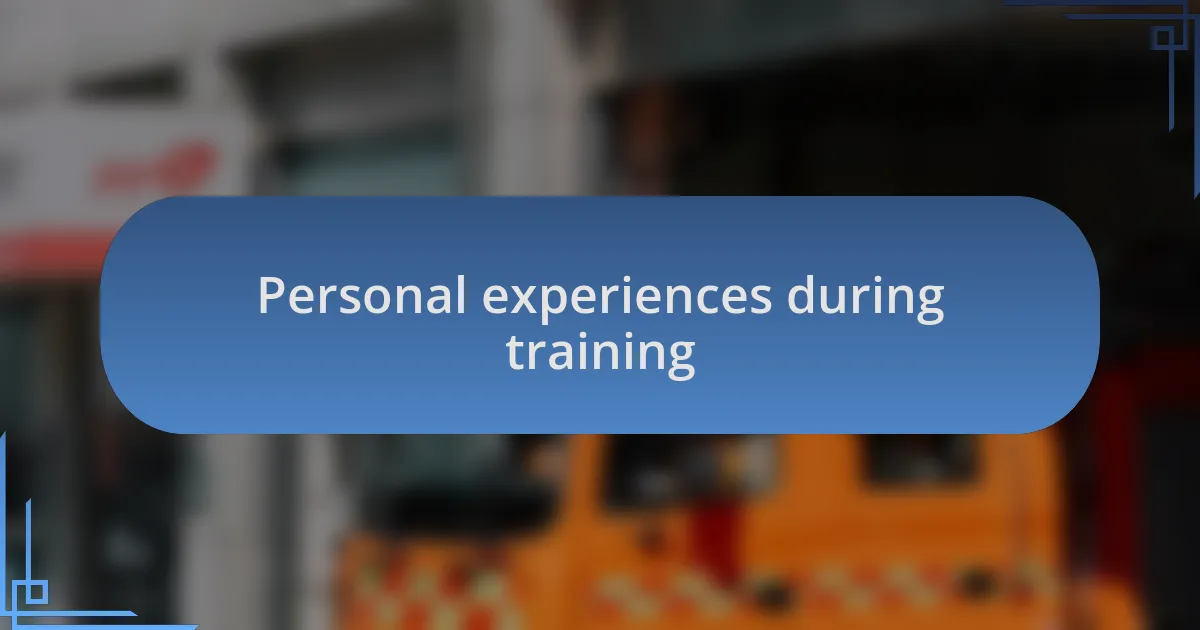
Personal experiences during training
During training, I faced the daunting task of navigating a smoke-filled maze, simulating a real-life fire scene. It was disorienting, and my heart raced as I struggled to regulate my breathing. That experience taught me the critical importance of remaining calm under pressure. How do you handle your breathing when things get chaotic?
Another memory that stands out for me is when I participated in a mock rescue operation. The weight of the equipment felt heavy on my shoulders, but I pushed through, determined to complete the drill. As I emerged from the exercise, soaked in sweat and exhilarated, I realized how physical endurance can directly impact our mental resilience. Have you ever noticed how physical challenges can change your mindset in high-stress situations?
One cold morning, we were tasked with extinguishing a controlled burn while blindfolded, relying solely on our teammates’ instructions. It was a surreal experience, amplifying my understanding of trust and communication. The adrenaline rush was intense, but those moments forged bonds among us that are hard to break. How do you think trust develops in such high-stakes scenarios?
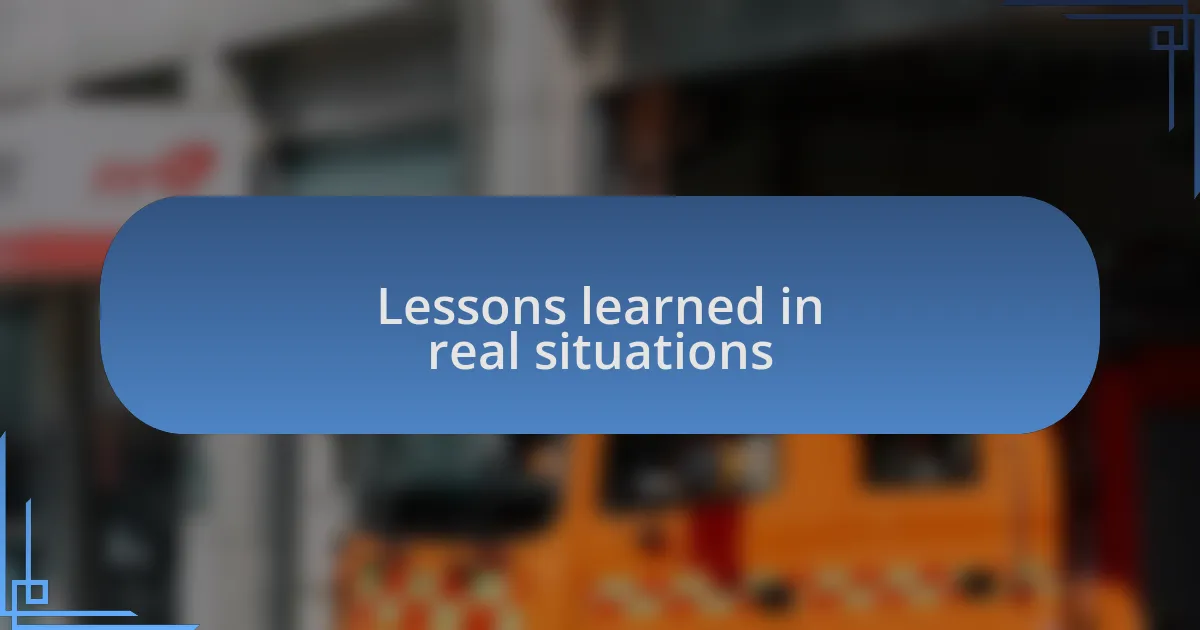
Lessons learned in real situations
In one real emergency, I responded to a house fire where the heat was overwhelming. As I entered the building, I could feel my senses heightening; the crackling flames and the smell of smoke were vivid reminders of the stakes. That experience taught me that in chaos, focusing on each task at hand is paramount. Have you ever found clarity in overwhelming situations by narrowing your focus?
Another time, I was involved in a car accident rescue, where every second counted. Working alongside my team, we had to communicate effectively despite the noise and panic around us. Witnessing how quickly we adapted to one another’s cues reinforced my belief in the power of teamwork. How do you foster effective communication amidst urgency?
I vividly remember a recent training drill where we had to navigate through a simulated rescue while dealing with loud distractions. It reminded me of a real incident when sirens blared around us as we worked. I realized that staying focused is not just about physical skills; it’s an emotional battle, too. Have you ever been in a situation where your emotions influenced your ability to perform? The awareness of our emotions can undeniably shape our responses in critical moments.